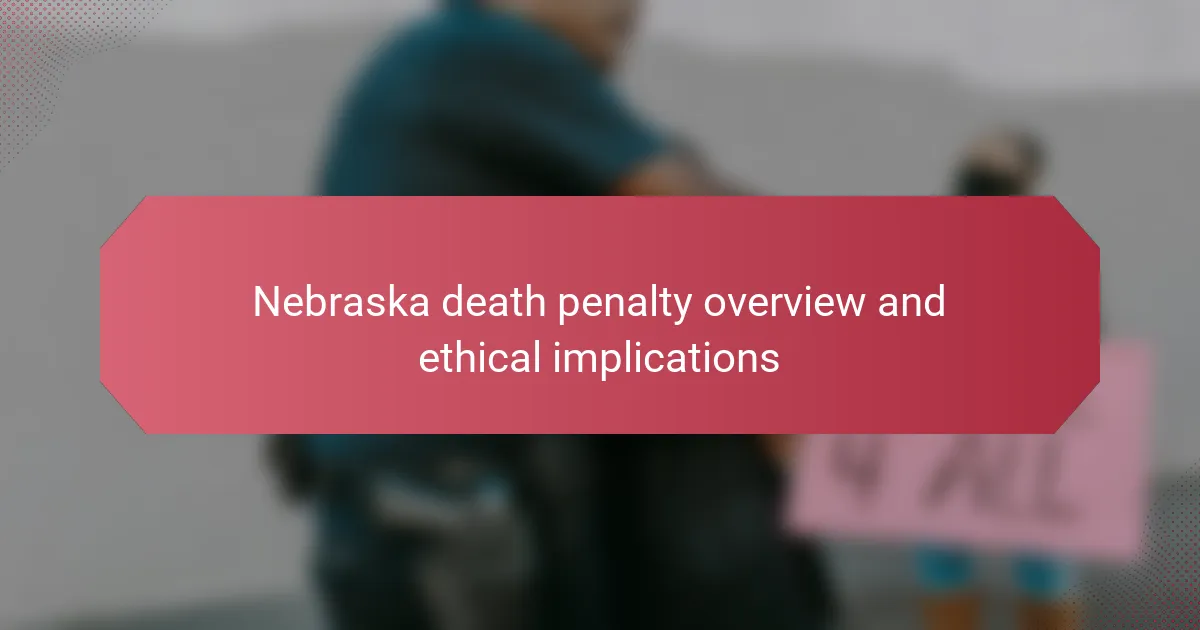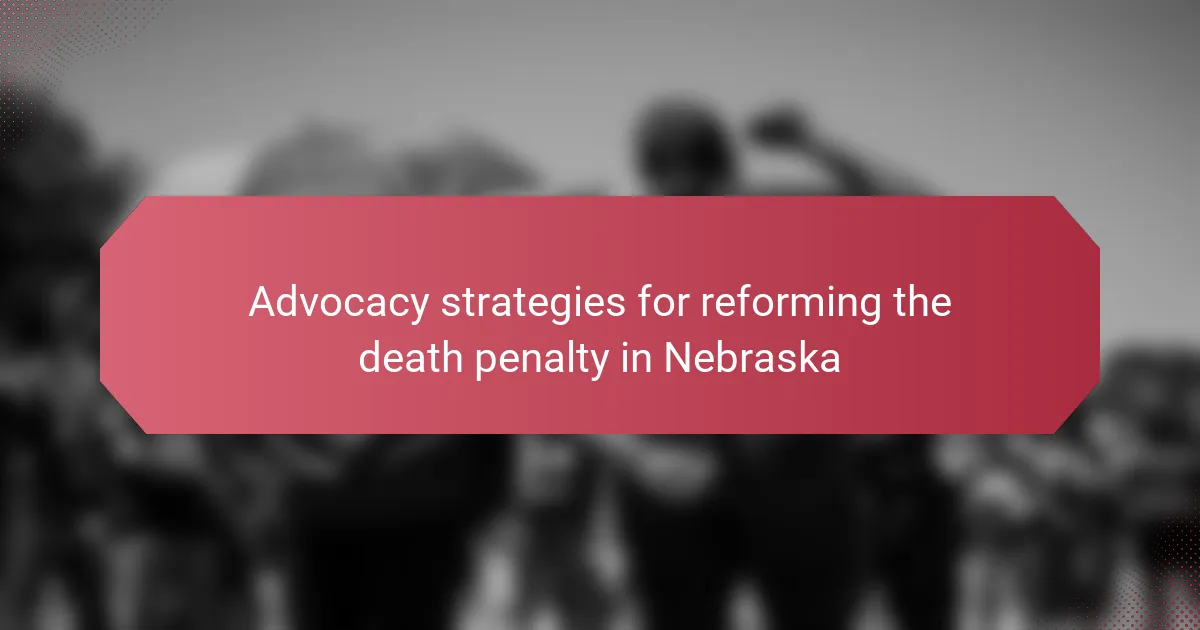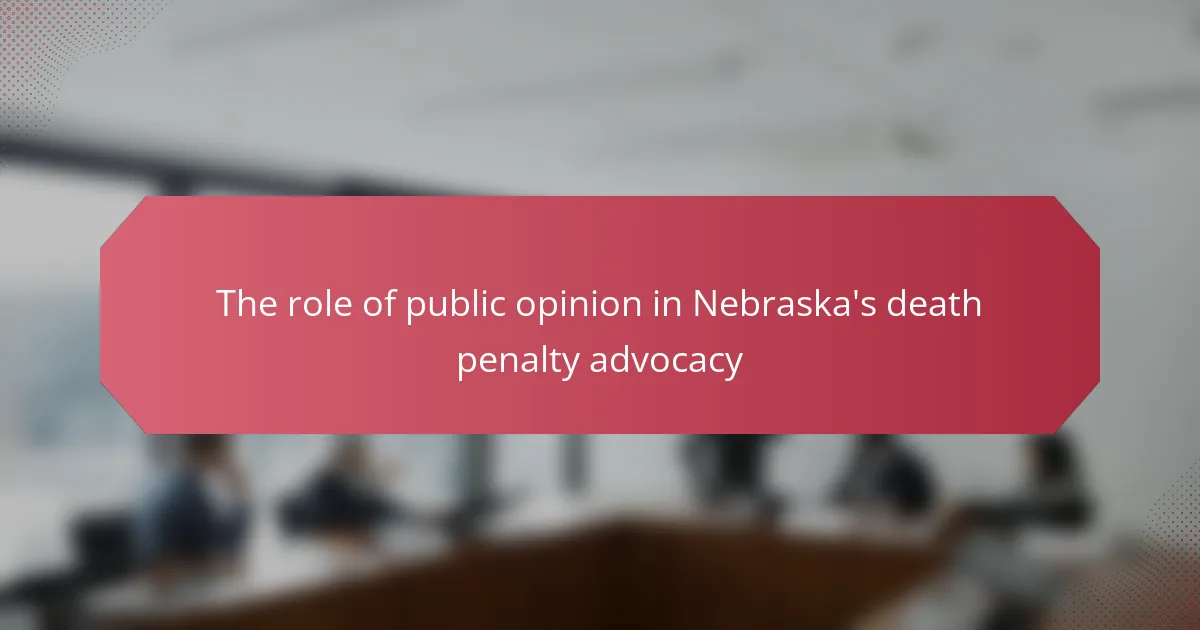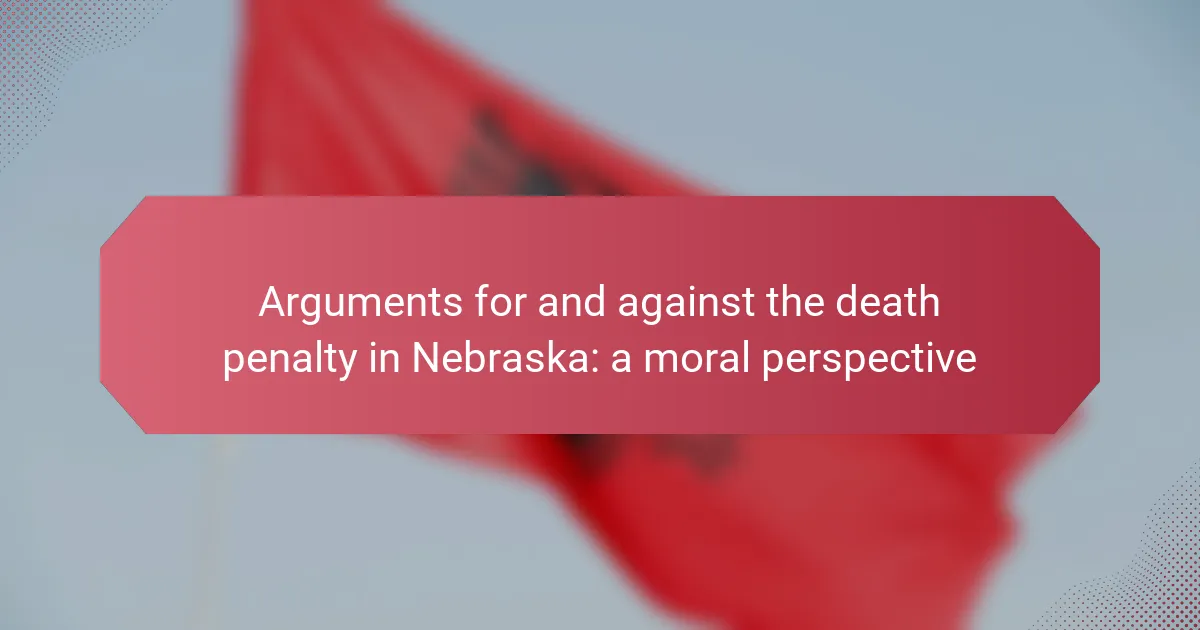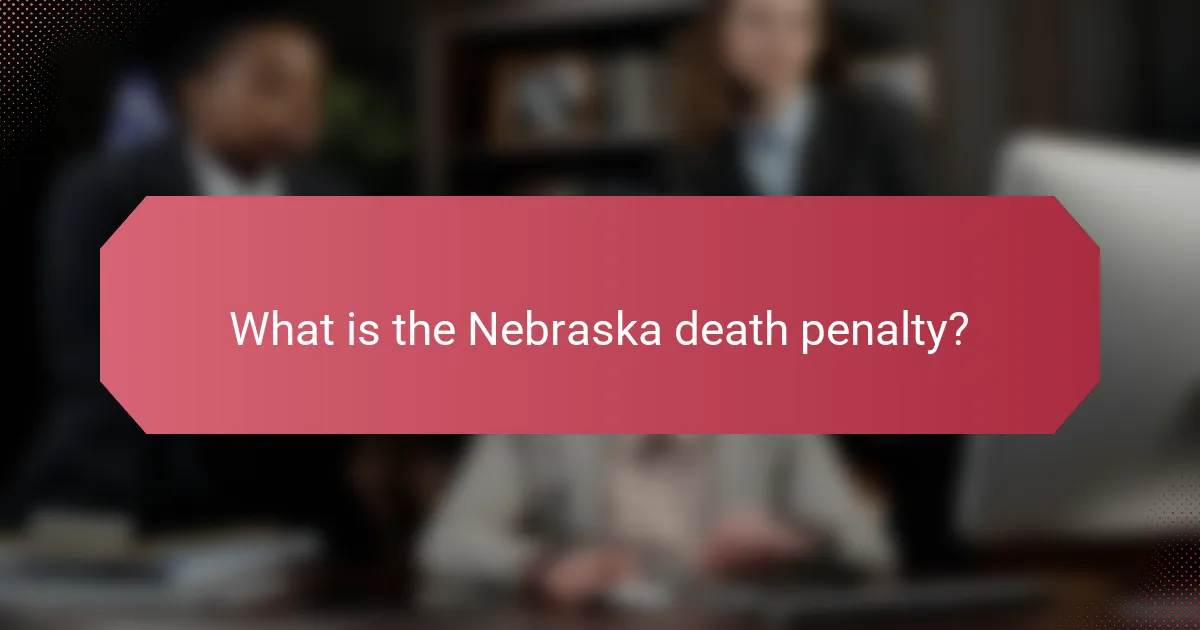
What is the Nebraska death penalty?
The Nebraska death penalty is a legal punishment for certain crimes in the state of Nebraska. It is enforced for severe offenses, primarily murder. Nebraska reinstated the death penalty in 2016 after a brief period of abolition. The method of execution in Nebraska is lethal injection. As of 2023, there are currently ten individuals on death row in the state. The death penalty has faced significant ethical debates and legal challenges in Nebraska. Critics argue it is inhumane and prone to wrongful convictions. Supporters claim it serves as a deterrent against serious crimes. The ongoing discussion reflects broader national conversations about capital punishment.
How is the death penalty implemented in Nebraska?
The death penalty in Nebraska is implemented through a series of legal procedures established by state law. The process begins with a conviction for a capital offense, which must be followed by a sentencing phase. During this phase, jurors decide whether to impose the death penalty or life imprisonment. If the death penalty is chosen, the sentence is reviewed by the Nebraska Supreme Court. Execution methods have changed over time, with lethal injection currently being the primary method used. Nebraska has faced challenges regarding the availability of execution drugs. The state has also seen legal debates surrounding the death penalty’s constitutionality. As of now, there are no executions pending in Nebraska.
What are the legal processes involved in the Nebraska death penalty?
The legal processes involved in the Nebraska death penalty include several key stages. Initially, a death penalty case begins with the trial phase. During this phase, prosecutors must prove the defendant’s guilt beyond a reasonable doubt. If convicted, the case moves to the sentencing phase. In this phase, the jury considers aggravating and mitigating factors to determine if the death penalty is appropriate.
After sentencing, the defendant has the right to appeal. This appeal process examines legal errors that may have occurred during the trial. If the appeal is unsuccessful, the case may proceed to post-conviction relief. This allows the defendant to challenge the conviction based on new evidence or ineffective legal representation.
Additionally, the Nebraska Supreme Court reviews death penalty cases. This review ensures that the sentence aligns with state law and constitutional standards. Execution cannot occur until all legal avenues are exhausted. These processes are designed to uphold justice and prevent wrongful executions.
What crimes are eligible for the death penalty in Nebraska?
In Nebraska, the crimes eligible for the death penalty are first-degree murder and certain acts of homicide involving aggravating factors. First-degree murder is defined as the intentional killing of another person. Additionally, the state considers factors such as the murder being committed during a robbery, [censured] assault, or other specified felonies. Nebraska law outlines these criteria in the Nebraska Revised Statutes. The legal framework emphasizes the severity of the crime and the circumstances surrounding it as key determinants for capital punishment eligibility.
What historical context surrounds the Nebraska death penalty?
The Nebraska death penalty has a complex historical context. It was first enacted in 1867. The initial method of execution was hanging. In 1972, the U.S. Supreme Court ruled the death penalty unconstitutional, leading to a moratorium in Nebraska. The state reinstated capital punishment in 1979. Nebraska has used the electric chair and lethal injection as execution methods. In 2015, the Nebraska legislature voted to abolish the death penalty, but the governor vetoed the bill. In 2016, a referendum reinstated the death penalty. This history reflects ongoing debates about justice, morality, and public opinion in Nebraska.
How has the Nebraska death penalty evolved over time?
The Nebraska death penalty has undergone significant changes since its inception. Initially, the death penalty was established in Nebraska in 1873, primarily using hanging as the method of execution. In 1972, the U.S. Supreme Court’s decision in Furman v. Georgia led to a temporary suspension of the death penalty in Nebraska. In 1979, the state reinstated the death penalty, adopting the electric chair as the primary method.
In 2009, Nebraska switched to lethal injection, reflecting a national trend towards this method. However, in 2015, the Nebraska legislature voted to abolish the death penalty, overriding a gubernatorial veto. This marked a significant shift in public opinion and legislative action against capital punishment.
Despite the repeal, a referendum in 2016 reinstated the death penalty, indicating ongoing debate within the state. As of 2021, Nebraska has faced challenges regarding the availability of lethal injection drugs, complicating the execution process. Overall, the evolution of the Nebraska death penalty reflects changing legal, social, and ethical perspectives on capital punishment.
What significant legal cases have impacted the Nebraska death penalty?
The significant legal cases that have impacted the Nebraska death penalty include State v. Mata and State v. Moore. In State v. Mata (2015), the Nebraska Supreme Court ruled that the state’s lethal injection protocol was constitutional. This decision upheld the method of execution used in Nebraska. In State v. Moore (2018), the court addressed the issue of mental competency in death penalty cases. The ruling emphasized the need for a thorough evaluation of a defendant’s mental state before execution. These cases illustrate the evolving legal landscape surrounding the death penalty in Nebraska.
What ethical implications are associated with the Nebraska death penalty?
The ethical implications associated with the Nebraska death penalty include concerns about justice, deterrence, and the sanctity of life. Critics argue that the death penalty may not effectively deter crime. Studies have shown that states with the death penalty do not have lower crime rates compared to those without it. There are also issues of wrongful convictions, as DNA evidence has exonerated individuals previously sentenced to death. The risk of executing an innocent person raises significant moral questions. Additionally, the application of the death penalty often reflects racial and socioeconomic biases. This disparity challenges the fairness of the justice system. The ethical debate also encompasses the psychological impact on those involved in the execution process. Overall, these implications highlight the complex moral landscape surrounding the use of the death penalty in Nebraska.
Why do some people support the death penalty in Nebraska?
Some people support the death penalty in Nebraska due to beliefs in justice and deterrence. They argue it serves as a punishment for the most heinous crimes. Supporters claim it provides closure for victims’ families. They also believe it can deter potential criminals from committing serious offenses. In Nebraska, public opinion polls have shown fluctuating support for the death penalty. Legislative debates often highlight these viewpoints. Historical context shows that some states have maintained the death penalty as a legal option. Advocates argue that it upholds societal values regarding crime and punishment.
What are the main arguments against the death penalty in Nebraska?
The main arguments against the death penalty in Nebraska include moral objections, wrongful convictions, and financial costs. Many argue that taking a life is inherently wrong, regardless of the crime. The risk of executing an innocent person is a significant concern. A study by the National Academy of Sciences found that wrongful convictions occur in 4.1% of capital cases. Additionally, the financial burden of the death penalty is higher than life imprisonment. The Nebraska Legislative Fiscal Office estimated that the cost of a death penalty case is three times greater than a life sentence. These arguments highlight ethical and practical issues surrounding capital punishment in Nebraska.
How does public opinion influence the Nebraska death penalty?
Public opinion significantly influences the Nebraska death penalty. When the majority of Nebraskans support capital punishment, lawmakers are more likely to maintain or strengthen it. In contrast, when public sentiment shifts towards opposition, legislative actions may reflect that change. For instance, a 2015 referendum showed that 61% of voters favored retaining the death penalty. This strong support led to the continuation of capital punishment in the state. Additionally, public opinion can impact the decisions of governors and prosecutors regarding death penalty cases. Changes in opinion often prompt discussions about reform or abolition, indicating its powerful role in shaping policy.
What surveys or studies reflect public sentiment on the death penalty in Nebraska?
Surveys and studies reflecting public sentiment on the death penalty in Nebraska include the 2020 Nebraska Public Opinion Poll. This poll indicated that 60% of Nebraskans supported the death penalty. Another study by the Nebraska Commission on Law Enforcement and Criminal Justice in 2019 found that public support was at 65%. Additionally, a 2021 survey by the Pew Research Center revealed that 54% of Nebraskans favored capital punishment over life imprisonment. These findings collectively demonstrate a significant portion of the population’s support for the death penalty in Nebraska.
How have changes in public opinion affected legislation regarding the death penalty?
Changes in public opinion have significantly influenced legislation regarding the death penalty. In recent years, there has been a notable decline in support for capital punishment across various demographics. Surveys indicate that a majority of Americans now favor alternatives to the death penalty, such as life imprisonment without parole. This shift has prompted lawmakers to reconsider existing death penalty statutes.
In Nebraska, public opinion has played a crucial role in legislative changes. In 2015, the Nebraska Legislature voted to abolish the death penalty, reflecting growing concerns about its morality and effectiveness. The decision was influenced by a shift in public sentiment, with increasing advocacy for humane treatment of individuals and a focus on wrongful convictions.
Subsequently, a referendum in 2016 saw voters reinstating the death penalty, highlighting the complex relationship between public opinion and legislation. This back-and-forth demonstrates how fluctuating views can lead to significant legal changes. Overall, changes in public opinion continue to shape the legislative landscape surrounding the death penalty in Nebraska and beyond.
What are the challenges and controversies surrounding the Nebraska death penalty?
The challenges and controversies surrounding the Nebraska death penalty include legal disputes, ethical concerns, and public opinion. Legal challenges often arise from issues related to the method of execution and the fairness of trials. Ethical concerns focus on the morality of capital punishment and its effectiveness as a deterrent to crime. Public opinion in Nebraska has fluctuated, with significant opposition leading to legislative attempts to abolish the death penalty. In 2015, the Nebraska Legislature voted to repeal the death penalty, but a subsequent referendum reinstated it in 2016. These dynamics illustrate the ongoing debate over the death penalty’s role in the state’s justice system.
What issues arise in the execution process in Nebraska?
Issues in the execution process in Nebraska include legal challenges, drug shortages, and ethical concerns. Legal challenges arise from lawsuits questioning the constitutionality of the death penalty. Drug shortages affect the availability of lethal injection substances, leading to delays. Ethical concerns involve the morality of capital punishment and the potential for wrongful executions. In 2015, the Nebraska Legislature passed a bill to abolish the death penalty, but it was later overturned by a voter referendum. These factors contribute to ongoing debates about the efficacy and humanity of the execution process in Nebraska.
How do racial and socioeconomic factors play a role in the Nebraska death penalty?
Racial and socioeconomic factors significantly influence the application of the death penalty in Nebraska. Studies indicate that defendants from minority backgrounds are more likely to receive death sentences. For instance, a report by the American Civil Liberties Union (ACLU) highlighted that African American defendants are disproportionately represented on death row. Socioeconomic status also plays a critical role. Defendants with limited financial resources often lack adequate legal representation. This disparity can lead to harsher sentences compared to wealthier individuals who can afford better defense. Furthermore, data shows that counties with higher poverty rates tend to impose the death penalty more frequently. These factors create systemic inequalities within the Nebraska death penalty framework.
What alternatives to the death penalty exist in Nebraska?
Life imprisonment without parole is the primary alternative to the death penalty in Nebraska. This option allows offenders to serve their sentences in prison for life, without the possibility of parole. Nebraska law permits this sentencing for serious crimes, including murder. Additionally, there are options for lesser sentences, such as fixed-term imprisonment. These alternatives focus on rehabilitation and public safety rather than capital punishment. The state has shifted away from the death penalty, reflecting changing views on its ethical implications. In recent years, Nebraska has seen a decline in executions and a move towards life sentences.
What are the life imprisonment options available instead of the death penalty?
Life imprisonment options available instead of the death penalty include life without parole and life with the possibility of parole. Life without parole means the individual will spend their entire life in prison without any chance of release. This option ensures that the offender cannot return to society. Life with the possibility of parole allows for a review of the inmate’s case after a certain period. In Nebraska, this period is typically 20 years. Both options serve as alternatives to capital punishment. They aim to provide justice while avoiding the ethical concerns surrounding the death penalty. Life sentences reflect a commitment to rehabilitation and public safety.
How do alternatives impact the justice system in Nebraska?
Alternatives significantly impact the justice system in Nebraska by providing options beyond traditional punitive measures. These alternatives include diversion programs, restorative justice, and sentencing reforms. They aim to reduce recidivism and offer rehabilitation for offenders. For example, Nebraska’s juvenile diversion programs have shown a decrease in re-offense rates. Additionally, restorative justice initiatives encourage accountability and victim-offender dialogue. This shift towards alternatives can lead to lower incarceration rates and reduced costs for the state. Evidence from studies indicates that effective alternatives can improve community safety and enhance the overall justice process.
What best practices can be observed in the debate over the Nebraska death penalty?
Best practices in the debate over the Nebraska death penalty include fostering open dialogue among stakeholders. Engaging diverse perspectives encourages comprehensive understanding of the issue. Facilitating public forums allows citizens to voice their opinions and concerns. Utilizing data-driven research supports informed decision-making. Transparency in legislative processes builds trust within the community. Analyzing case studies from other states provides valuable insights. Collaborating with legal experts ensures adherence to constitutional standards. Lastly, promoting restorative justice principles can shift focus from punishment to rehabilitation.
The Nebraska death penalty is a legal punishment for severe crimes, primarily murder, reinstated in 2016 after a brief abolition. This article provides an overview of the death penalty’s implementation, legal processes, and eligible crimes in Nebraska, along with its historical context and evolution. It also explores significant legal cases, ethical implications, public opinion, and the challenges surrounding capital punishment in the state. Additionally, the article examines alternatives to the death penalty and their impact on the justice system, highlighting ongoing debates and best practices in addressing this complex issue.
